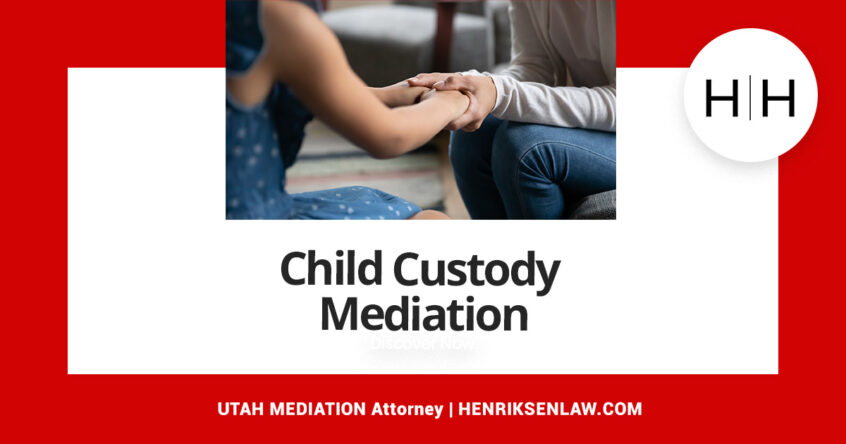What Happens in Mediation for Child Custody?

Separation and divorce are tough on everyone- you, your ex, your kids, and even your extended family. When emotions run high and the future feels uncertain, it’s easy for disagreements to spiral out of control, with neither side wanting to budge. Situations like these can make it hard to arrive at decisions that truly put the kids first.
In this context, mediation is by far the best means to resolve parental issues. It’s quicker, less costly, and helps you and your kids step off the emotional rollercoaster, so you can start moving forward with your lives.
But what exactly happens during child custody mediation?
Let’s break down what to expect and how you can make the best decisions for your child’s well-being.
What is Child Custody Mediation?
By definition, mediation for child custody is a process where separating or divorcing parents work with a neutral third party, called a mediator, to create a parenting plan that lays out how they’ll care for their kids.
In Utah, mediation is often recommended before you can take parenting issues to court. It’s seen as a great way to help families settle disputes and make good decisions for their children.
By choosing mediation, parents can skip the expensive, lengthy, and emotionally exhausting court process and instead work together to find solutions that work for everyone.
Preparing for Mediation: What You Need to Know
It’s important to prepare for mediation. Before you walk into that room, take some time to think about what’s best for your child. What do they need most? What would be the ideal situation for them? You’ll want to keep their well-being at the center of everything.
Work with your mediation lawyers in Utah to gather any important documents that could help support your case, such as school records, medical information, or anything else that shows what your child needs. Also, jot down your main concerns and what you’re willing to compromise on.
Note that mediation isn’t about winning or losing; it’s about finding a solution that works for everyone, especially your child. So, go in with an open mind, ready to listen, and willing to work together with the other parent to find the most viable path forward.
How the Mediation Process Works
Mediation for child custody usually follows a few key steps.
1. Opening Statements
The process begins with each parent getting a chance to share their concerns and what they hope to achieve. Think of this as setting the stage rather than diving into a debate. It’s wise to use this moment to explain what’s important to you without turning it into an argument.
2. Joint Discussion
After the opening statements, the mediator will lead a discussion where both parents can talk about different aspects of custody. Typically, it will cover things like where the child will live, visitation schedules, holidays, schooling, and any other important issues. The mediator’s role here is to keep the conversation focused and fair.
3. Private Sessions (Caucuses)
Sometimes, the mediator might meet with each parent separately in what’s called a caucus. This gives you a chance to talk more openly about your concerns without the other parent present. It’s a good opportunity to be honest about what you need and what you’re willing to negotiate on, which can help the mediator better understand both sides.
4. Negotiation and Compromise
The mediator will help both parents identify areas where they can find common ground and work toward an agreement. The focus is always on the child’s well-being, while also being fair to both parents.
5. Reaching an Agreement
If everything goes smoothly, the mediation ends with a written agreement that outlines the custody arrangement. Both parents will review this document, and if they’re happy with it, it can be made legally binding.
Tips for a Successful Mediation
Mediation can be a challenging process, but with the right approach, it can lead to a positive outcome. Here are some tips to help you make the most of child custody mediation.
1. Stay Focused on Your Child
You may be tempted to bring up past conflicts or grievances with the other parent, but that won’t help your case or your child.
Instead, focus on what arrangements will best support your child’s needs. Remember, this is about their future, not rehashing the past.
2. Be Willing to Listen and Compromise
If you go into mediation with a rigid mindset, refusing to bend on any issue, you’re likely to hit a deadlock. Be open to hearing the other parent’s perspective and be prepared to compromise where you can.
3. Stay Calm and Respectful
It’s easy to get frustrated during mediation when the other parent is pushing your buttons. But you need to stay calm and respectful to keep the process on track. When you remain composed, it’s easier to focus on the end goal.
4. Take Breaks if Needed
If you feel emotions starting to overwhelm you, feel free to ask for a break. Sometimes, stepping away for a few minutes can help you regain your composure and return to the discussion with a clearer head. It’s better to pause and take a moment to breathe than to make hasty decisions you might regret later.
What if Mediation Fails?
Mediation is a great tool for resolving child custody issues, but it isn’t a guaranteed fix. In some cases, parents just can’t agree on everything, no matter how hard they try.
If mediation doesn’t work out, your Utah mediation attorney might suggest going to court, where a judge will make the final decisions.
However, even if mediation doesn’t result in a full agreement, it’s not a total loss. The process can still be really helpful in clarifying what each parent wants and what the main sticking points are. In other words, mediation can make any future court proceedings shorter and less contentious because you’ve already worked through some of the issues.
Conclusion
Opting for mediation is a strong commitment to working together in a way that puts your child’s needs first. So, if you’re facing tough decisions, think about choosing mediation. It’s a way to handle things with grace, understanding, and, most importantly, love for your child.
The mediation lawyers in Utah at Henriksen & Henriksen are here to help you find the best path forward for your family. Contact us today to schedule a consultation and start working towards a satisfactory resolution.
